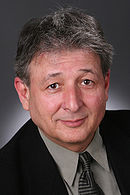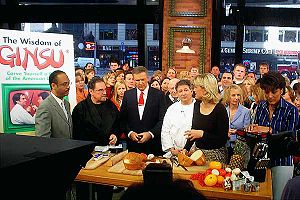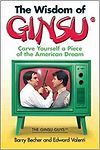
Ed Valenti
Encyclopedia

Infomercial
Infomercials are direct response television commercials which generally include a phone number or website. There are long-form infomercials, which are typically between 15 and 30 minutes in length, and short-form infomercials, which are typically 30 seconds to 120 seconds in length. Infomercials...
, or "long-form" (two-minute) advertising format.
Dial Media, Inc. founded by the pair in Warwick, RI in 1975 forever changed the way products are sold on television. Valenti's infomercials first aired in the mid 1970s and aimed to sell the Miracle Slicer, Miracle Duster, Miracle Painter and Ginsu knife. The success of the Ginsu
Ginsu
The Ginsu knife is a product best known for the sales techniques used to promote it.The "amazing" Ginsu knife became known to millions of television viewers in the USA through ubiquitous television advertisements in the 1970s...
campaign led to widespread adoption of the format for a variety of products, including jewelry (Chainge adjustable necklace), cookware (Armourcote cookware), mixing bowls (Royal DuraSteel), food storage containers (VacuFresh and VacuClear) and watches (MultiChron, Westport), among others, and eventually led to the formation of Home Shopping Channels QVC
QVC
QVC is a multinational corporation specializing in televised home shopping. Founded in 1986 by Joseph Segel in West Goshen Township, Pennsylvania, United States, QVC broadcasts in five countries as QVC US, QVC UK, QVC Germany, QVC Japan and – QVC Italy to 200 million households...
and HSN.
The Birth of the Infomercial
Working with his partner Barry Becher, Valenti developed many of the best known catch phrases and product demonstrations, as well as the standard format of the long-form (two minute, 90 second) advertisement. In contrast to traditional short-form or "brand" advertising, such as the 30-second or 60-second spot, Valenti's long-form advertisements were the pre-cursors of the full half-hour television program length (half-hour) infomercials now commonly used to sell a variety of products and services on television. The intent of this new format was to elevate a particular product to the role of protagonist, showing the product benefits and a variety of uses through attention grabbing demonstrations, hopefully leading to direct sales of the product. Such products are often only available through consumer direct orders and can not be purchased in stores. Ironically, this "direct response" long form commercialTelevision advertisement
A television advertisement or television commercial, often just commercial, advert, ad, or ad-film – is a span of television programming produced and paid for by an organization that conveys a message, typically one intended to market a product...
format, intended to primarily sell products directly to consumers, created at the same time one of the most recognizable, memorable, and long lasting "brands" in advertising history: Ginsu Knives.
The first such product marketed by Valenti to achieve multi-million dollar sales was also the first product he and Becher ever marketed: The Miracle Painter ("Why is this man painting his ceiling in a tuxedo?") It was soon followed by the Miracle Duster and Miracle Slicer. Easily the best known of Valenti's products was (and still is) the Ginsu Knife. The most profitable was Armourcote Cookware, with sales exceeding $80 million.
But Wait! There's More
Valenti's contributions to the long-form advertisement and the Direct Response Television advertising industry include the use of some now well known catch-phrases (originally used by JAM Auctioneers at State Fairs*), such as "But Wait! There's More*", "Now How Much would you pay*?", "You get it all for the incredible low price of only $19.99", "But this is a limited time offer, so call now" and variations thereof. Such statements suggest to viewers that they are taking part in a live marketplace experience in which the vendor continuously offers the buyer more items at the same purchase price as an escalating enticement, with bonus items for immediate action/purchase otherwise known as a(n) (Atlantic City) "boardwalk product pitch". He and partner Barry Becher also pioneered the use of toll free numbers in television ads and the use of credit cards to order the products they sold in "spot" markets nationwide.Valenti realized that, in order for the long-form commercial to be successful at driving immediate sales, viewers would need to be advised to make an immediate purchase. To satisfy this need he and Barry Becher created 1-800 "toll-free" numbers with phone banks ready to take orders the moment the infomercial aired on a 24 hour basis, days, and even weeks after the initial spot aired. In order to add a sense of urgency to the purchase, the viewer was advised to order the item immediately ("Call now"), rather than postponing it. This "call to action", like the use of toll free numbers and credit cards, has become a standard component of successful direct response advertising over the years.

Hyperbole
Hyperbole is the use of exaggeration as a rhetorical device or figure of speech. It may be used to evoke strong feelings or to create a strong impression, but is not meant to be taken literally....
: The products WERE limited to the amount that had been produced, but with careful planning would never actually run out, and bonus items, although part of a "limited time" offer" would usually be awarded at the sellers discretion, no matter how long a caller waited to order after the end of the infomercial.
Valenti also developed the idea that infomercials ought to demonstrate the featured product being used in ways the average consumer would probably never find a regular need for. This measure was intended to increase the perceived value and utility of the product. It is for this reason that the Ginsu knife is often seen cutting through metal cans, a nail, a radiator hose or a tree trunk, before cleanly cutting a paper thin slice of tomato, though few consumers would ever find a need to do all of those things, especially in rapid succession. This, along with grease copy and humor, helped to break through the clutter of advertising to make the Ginsu knives one of the most memorable and recalled spots of its time.
Today
Today, Ed Valenti is the Founder and Chief Operating Officer of PriMedia Inc., national media buying and marketing services in Warwick, Rhode IslandWarwick, Rhode Island
Warwick is a city in Kent County, Rhode Island, United States. It is the second largest city in the state, with a population of 82,672 at the 2010 census. Its mayor has been Scott Avedisian since 2000...
"Outside Providence" and he oversees the purchasing of ad time for a variety of products via general, direct response, and "brand direct" advertising campaigns. With his success as a marketing guru
Guru
A guru is one who is regarded as having great knowledge, wisdom, and authority in a certain area, and who uses it to guide others . Other forms of manifestation of this principle can include parents, school teachers, non-human objects and even one's own intellectual discipline, if the...
, Valenti has moved into publishing. His career/life guide The Wisdom Of Ginsu (2005 Career Press) uses metaphors from the "Ginsu Years" and his 30 plus years in business as a way of imparting self-help advice designed to assist others both personally and professionally.

He and partner James J. Cooney
James J. Cooney
Jim Cooney is an internationally recognized direct marketing and media buying executive with 30 years of local, regional, national and international experience. His mentors were direct marketing pioneers Ed Valenti, Barry Becher and Arthur Schiff whom he began working with directly out of college...
are also currently marketing the next generation of Ginsu knives and other products online at GinsuGuys.com.
Recent news
- "Legislator's Sharp Idea: Name Street Ginsu Way" by Michael McKinney, The Providence Journal
- "30 years later, this iconic knife still carving its name" by Isabel Gottlieb, The Brown Daily Herald
Clips
- Ginsu Hollywood Clips
- Original Ginsu Ad
- Original Ginsu II Ad
- The Wisdom of Ginsu- Ed Valenti as keynote speaker at the Measurement Science Conference - Disneyland Hotel, Anaheim, CA.

